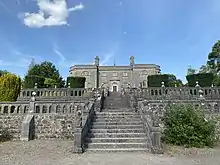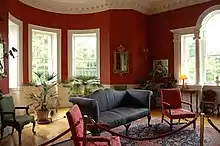Belvedere House and Gardens
Belvedere House and Gardens (Irish: Teach Belvedere agus Gairdiní) is a country house located approximately 8 kilometres (5 mi) from Mullingar, County Westmeath in Ireland on the north-east shore of Lough Ennell.[1] It was built in 1740 as a hunting lodge for Robert Rochfort, 1st Earl of Belvedere by architect Richard Cassels, one of Ireland's foremost Palladian architects.[2]
| Belvedere House and Gardens | |
|---|---|
| Native name Irish: Teach Belvedere agus Gairdíní | |

 The exterior, and the Drawing Room | |
| Type | Country house |
| Location | Mullingar, County Westmeath, Ireland |
| Area | 160 acres (65 ha) |
| Built | 1740 |
| Architect | Richard Cassels |
| Architectural style(s) | Palladian |
| Owner |
|
Although not very large, it is because of its Diocletian windows and dramatic nineteenth-century terracing.[3] When Robert Rochfort decided to use Belvedere as his principal residence, he employed French stuccatore Barthelemij Cramillion, to execute the Rococo plasterwork ceilings which are among the most exquisite in the country. The landscaped demesne boasts the largest and most spectacular folly and spite wall in the country, The Jealous Wall, built to block off the view of his estranged brother's house nearby. There is also Victorian walled garden and many hectares of forest. The house has been fully restored and the grounds are well maintained, attracting some 160,000 visitors annually.
History
The house was initially built by Robert Rochfort as a retreat, having incarcerated his wife in their previous home at Gaulstown, for an alleged affair with his brother Arthur. Arthur was later put on trial and fined £20,000 which he could not pay. Arthur spent 18 years in debtors' prison in Dublin but was released upon Robert's death. Robert built The Jealous Wall after falling out with his brother George, who lived on the adjacent estate at Tudenham. His wife was only released on his death in 1774. The estate passed to his son George Augustus Rochfort, the 2nd Earl. He was MP for County Westmeath from 1761 to 1776 and High Sheriff of Westmeath for 1762. He left for England in 1798 and died in 1814. When his widow died in 1828, Belvedere passed to her grandson Brinsley Butler, 4th Earl of Lanesborough. He rarely visited Belvedere and it was subsequently inherited on his death by his cousin Charles Brinsley Marlay in 1847. Charles moved into the house and during his time there was responsible for the alteration of the Diocletian windows on the upper façade and for the addition of the terracing. He commissioned Ninian Niven, curator of the Botanic Gardens in Glasnevin, to draw up plans for the Victorian walled garden. In the period following the second world war, Charles Howard-Bury, who was a soldier and mountaineer, restored the house and gardens. He never married and on his death in 1963, the estate was inherited by Rex Beaumont. Rex had been Howard-Bury's friend and companion for 30 years, and sold the estate to Westmeath County Council in 1982 for £250,000. Following a multimillion-pound restoration, the house and gardens have been opened to visitors. Belvedere also hosts weekend music festivals, and intimate garden theatre performances.
Gallery
 The gardens at Belvedere
The gardens at Belvedere Ireland's largest folly, the Jealous Wall
Ireland's largest folly, the Jealous Wall The dining room
The dining room The Gothic Arch
The Gothic Arch
See also
References
- "Belvedere House Gardens & Park". www.belvedere-house.ie. Retrieved 15 December 2020.
- "From wicked to wonderful". The Irish Times. Retrieved 15 December 2020.
- FUSIO. "Belvedere House, BELVIDERE, County Westmeath". Buildings of Ireland. Retrieved 15 December 2020.
- "Belvedere House, County Westmeath". Ask about Ireland. Retrieved 13 December 2012.
- "Belvedere House Gardens & Park". Archived from the original on 21 December 2012. Retrieved 13 December 2012.
